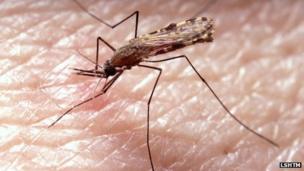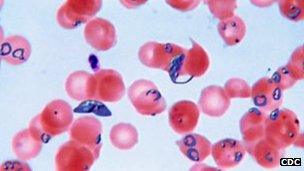Mosquitoes carrying the malaria parasite are more attracted to human body odour than uninfected insects, a study suggests.
Researchers found that infected insects were three times more likely to be lured towards a human scent.
They believe that the deadly parasites are seizing control of their biting hosts and boosting their sense of smell.
The research is published in the journal Plos One.
Dr James Logan, from the London School of Hygiene and Tropical Medicine (LSHTM), said: "One thing that always surprises me about parasites is how clever they are. They are these ever-evolving organisms that seem to be one step ahead of us the whole time."
Smelly feet
To carry out the study, the researchers infected malaria mosquitoes (Anopheles gambiae) with the most deadly form of parasite, Plasmodium falciparum.
They placed about 100 of the infected insects into a container, along with some nylon stockings that had been previously worn by volunteers for 20 hours.
"It is a very effective way of collecting body odour... the odour can remain attractive for months," explained Dr Logan.
The scientists repeated the experiment with uninfected insects.
They found that mosquitoes carrying the deadly parasite were three times more likely to be attracted to the smelly stockings.
The scientists believe this is because the tiny parasitic organisms are manipulating their hosts' sense of smell.
Dr Logan said: "We think it is giving them a heightened sense of smell. We are hypothesising there is an alteration somewhere in their olfactory system that allows them to find us quicker."
Smart tactics
By making humans an easier target, the parasite is more likely to be passed into the blood stream - ensuring its survival and continuing the spread of the deadly disease.
The researchers will now begin a three-year project, funded by the Biotechnology and Biological Sciences Research Council (BBSRC), to learn more about how the parasites are doing this.
Dr Logan said that understanding how the malaria-infected mosquitoes respond to human odour could help them to fight the disease.
He said: "If we know how the parasite is able to manipulate the olfactory system... perhaps we can identify new attractants for infected mosquitoes and we will be able to increase our efficiency with trapping techniques."
According to the latest figures, the World Health Organization said there were about 219 million cases of malaria in 2010 and 660,000 deaths.
Africa is the most affected continent: about 90% of all malaria deaths occur there.


No comments:
Post a Comment